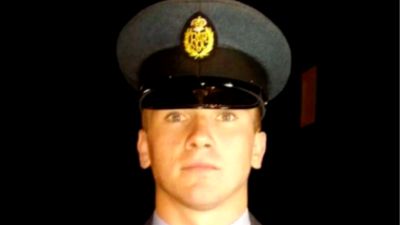Corrie McKeague inquest told airman would have 'been crushed or suffocated in minutes' in bin lorry

Missing airman Corrie McKeague "wouldn't have known much about it" if he had been crushed inside a bin lorry while drunk, his inquest has heard.
The RAF gunner, who was based at RAF Honington in Suffolk, vanished on a night out in Bury St Edmunds on 24 September 2016.
He was last seen on CCTV at 3.25am entering a service area behind a Greggs store and police believe he climbed into a bin which was then tipped into a waste lorry.
Home Office pathologist Dr Nat Cary told Suffolk Coroners Court that an individual would have become unconscious very quickly - within a couple of minutes - if they had been tipped into a waste lorry.
He said the Dennis Eagle dustcart was designed to crush and compress rubbish, meaning that the most likely cause of injuries would be crushing, and possibly suffocation from having the nose and mouth forced into surfaces where breathing became impossible.
He explained that compression could lead the heart to stop or cause head injuries that would lead to death more rapidly.
Suffolk’s senior coroner Nigel Parsley asked Dr Cary about possible causes of death if a person were to end up in the back of a bin lorry.
Dr Cary told the inquest in Ipswich: “The most obvious cause of death in those circumstances would be crushing.
“That refuse lorry is designed to crush and compress refuse. If an individual came into the chamber then crushing would be a likely possibility.
“Over and above that, multiple injuries – head injuries, injuries to the limbs.”
He said there could be the “same effect you get in a crowd crush”, adding that suffocation was also a possibility.
The driver of the lorry has previously told the inquest that he checked the bin before tipping it into the vehicle, and did not see anything suspicious.
Dr Cary said although the level of alcohol in Mr McKeague's system would have prevented him taking evasive action, it would not have contributed directly to his death.
He said a condition called postural asphyxia could occur after drinking, though very rarely, which would have meant the airman died in the bin before being tipped into the lorry. But he said the chance of this was "remote".
He told the inquest of five men and five women that he found it hard to see how anyone could have survived being tipped into the bin lorry.
Asked how quickly a person may fall unconscious, he said: “It does depend on the level of compression, which is an unknown, but given the levels of force involved in this lorry I would expect unconsciousness would occur quite rapidly within a few minutes.”
He said a medical cause of death of “unascertained” could be recorded when a body has not been found.
The inquest is continuing at Suffolk Coroners Court and is expected to conclude by the middle of next week.